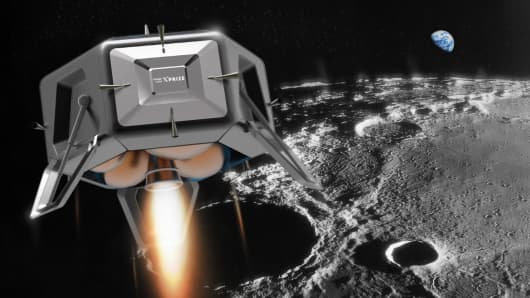
Source: Independence-X
On Saturday, the Kennedy Space Center is playing host to a launch by technology entrepreneur Elon Musk's SpaceX.
The Falcon 9 rocket's highly anticipated voyage is the latest symbol of how commercial space flight is firing up the public's imagination, and taking extraterrestrial exploration to the next level.
Not to be outdone by SpaceX, however, are two companies that lack Musk's star power but have become active players in a new space race that many observers speculate will become the next major source of wealth creation.
Moon Express and Planetary Resources are two start-ups in the white-hot global space sector that the FAA estimates is a combined $324 billion, and what some argue could become the first trillion-dollar industry. Industry players believe space exploration is due for a quantum leap, with commercial test launches abounding this year.
"This is the first post-global enterprise," said Chris Lewicki, president and CEO of Planetary Resources, an asteroid mining company.
While asteroid mining tends to conjure images of video games from the 1980s, Planetary Resources has its sights zeroed in on a future likely to be pioneered, if not dominated, by private companies.
"The first space colonies, tourist destinations, commercial laboratories all will be enabled by the business that we're growing," Lewicki told CNBC recently.
"Bringing back moon materials sounds much more complicated than it really is, for gravity is your friend."-Naveen Jain, co-founder, Moon Express
Begun six years ago, Planetary Resources calls Redmond, Washington, its home. With around 60 scientists, engineers, businessmen and economists, Planetary Resources works outside of NASA's shadow but has access to a nearby Boeing aerospace base and has broken ground on a European headquarters in Luxembourg.
The company's first satellite was "lost in spectacular fashion" in a launch explosion in 2014, according to Lewicki. Yet a successful July 2015 launch put the Planetary Resources back on track.
Two of its next experimental satellites, called Arkyd 6, will launch this year, with the first planned in coming months. The Arkyd 200 mission will explore an asteroid, specifically to locate water and measure its abundance.
"The fall of 2020 is our aim date for the first commercial mission, by the name Arkyd 200," Lewicki said. "We're in the detailed mission planning stages right now."
"If we have a successful result in 2020, the next mission will follow anywhere between two and four years later to extract a lot more water," Lewicki said.
Meanwhile, billionaire entrepreneur Naveen Jain is trying to engineer a soft lunar landing for his company, Moon Express, sometime this year.
Moon Express has won more than $500,000 under NASA's Innovative Lunar Demonstration Data Program, and $1.25 million as a part of Google's Lunar XPRIZE competition. The latter will award $30 million to the first company that lands a commercial spacecraft on the moon, travels 500 meters across its surface and sends high-definition images and video back to Earth.
The Florida based company recently licensed Cape Canaveral launch complexes from the Air Force. Jain believes that the plethora of options for rocket providers means that Moon Express can launch easily — from its existing five rocket contract with Rocket Lab to any other corporation in the mix, be it Virgin Galactic, Amazon's Blue Origin, SpaceX or Boeing.
Within 12 to 24 months of the first mission, Moon Express aims to send a second module to begin extracting resources.
"Once we land on the moon, what we're really doing is building an underlying infrastructure," Jain said. "Bringing back moon materials sounds much more complicated than it really is, for gravity is your friend."

Planetary Resources
The Arkyd 100 (A100) small satellite used by Planetary Resources to gather compositional data of asteroids during prospecting missions.
Both companies have courted tens of millions of dollars in private investment to fund R&D and initial missions. Until the Arkyd 200 reaches an asteroid or the MX-1E lands on the moon, the cornerstone of both business models remains in doubt.
However, both Lewicki and Jain insist their companies do not need to return materials to Earth to turn a profit.
"People think about asteroid mining as going deep into space, mining and bringing the materials back to Earth," Lewicki said. "But our business model is to be the lead in building space infrastructure."
Scouting for 'the eight continent'
Among the moon's mineral riches are gold and helium-3, a gas that can be used in future fusion reactors to provide nuclear power without radioactive waste. Jain said Moon Express' work will be more akin to collecting than traditional mining, as the minerals are from asteroids impacted on the surface.
However, the most important resource is water, which both executives emphasize as integral to building the sector and containing costs.
"Water is the perfect rocket fuel and the perfect fuel for humans. If you reduce the amount of weight from fuel at launch, you vastly reduce the cost," Jain said.
With only a few test launches remaining and both companies fully funded — Planetary Resources even claims to be already profitable — optimism among the industry's pioneer class is palpable.
"You have to realize this as the biggest industry in human history," Lewicki said. "We're now not limited by the land mass and population limits of planet Earth."
Jain argued that the moon will soon become as accessible as Australia, an outer space Outback. It "really can become an eighth continent," he said. He hopes Moon Express succeeds in a way that is visible to other aspiring entrepreneurs in the commercial space industry.
"Our landing on the moon will be the event which inspires people to take their own moon shot," Jain said.
By Michael Sheetz
No comments:
Post a Comment